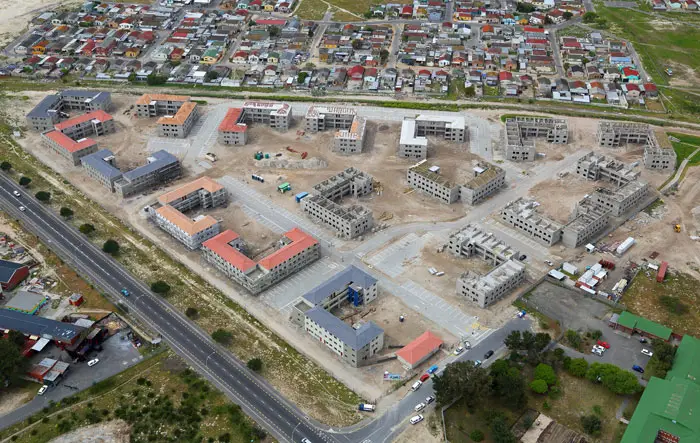Construction of student accommodation for the University of the Western Cape (UWC) at the Calgro M3’s Belhar CBD development has begun. With a critical shortage of student housing across South Africa, this will help ease the pressure in Cape Town for affordable accommodation of this nature.
The accommodation is to be built on three parcels of land located adjacent to one another within the Belhar development, which is a mixed-use, high density residential project. The 44 000m² site borders the southern boundary of the University of the Western Cape campus. It is also conveniently situated close to the Unibell train station and the Cape Peninsula University of Technology.
The student accommodation will comprise six buildings capable of housing 2,720 beds. Different types of sleeping quarters will be available to students, including single and double rooms, and double room apartments. In addition, there will be suitable accommodation and ablution facilities designed specifically to cater for disabled students.
Facilities within the residences
Various communal facilities will be located within the residences such as bathrooms, lounges, study and dining areas, kitchens, laundries and tuckshops, along with gym areas and residence manager apartments. All the buildings will be serviced with Wi-Fi, security fences, access control and CCTV – all in accordance with Government Gazetted specifications. The housing will also feature landscaped gardens.
Construction activities on the Unibell precinct started at the beginning of August 2020 and are due for completion, in phases, between October 2021 to February 2022.
Also Read: First 3D-printed residential building under construction in Germany
According to Wikus Lategan, CEO of Calgro M3, the company is extremely proud to be involved with this project, which will help ease the requirement for affordable student accommodation in Cape Town. “Current estimates are that there is a shortage of 300,000 beds for students nationwide. We are likewise considering developing private student residences at Belhar for another third party for this very reason,” said Lategan
He further explained that this current project is 50% funded by University of the Western Cape and 50% by the Development Bank of Southern Africa, and that once handed over, the university will have full ownership and management control of the residences, with security, access control, etc. designed to tie into its current systems.
With respect to the Belhar development as a whole, Lategan said the group had made significant progress, having built 1,497 units ranging from military veteran units to social housing units and open market apartments that fall into the income bracket qualifying for the FLISP subsidy.
“In addition, we’ve installed bulk infrastructure and internal infrastructure for almost 4,000 residential units, which included major road and stormwater drain upgrades, bulk water and sanitation upgrades and electrical infrastructure for the greater Belhar area. We’ve also created an opportunity and facilitated the process for the University of the Western Cape to acquire better located land on the border of its campus for the further development of sports facilities, etc. by means of a land swap agreement with the Western Cape Government on land originally earmarked to be developed on their behalf by ourselves,” he said.
Belhar CBD development
Belhar CBD development is a joint initiative undertaken by the Calgro M3 Group and the Western Cape Department of Human Settlement. “The strategic imperative of the Belhar CBD development is in support of the City of Cape Town’s Transformation Aim and the principles of the Integrated Human Settlement Framework by the creation of quality integrated communities ensuring an inclusive lifestyle development and successfully addressing spatial inequality in the city,” explained Lategan.
According to Lategan, the group has been working seamlessly in conjunction with local and provincial government and Eskom to deliver this student accommodation to the university on time and within budget.
